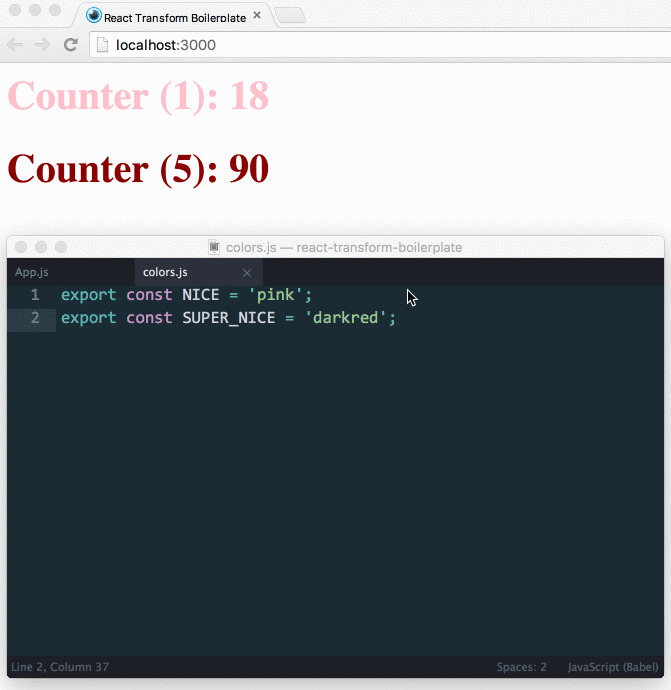This Babel plugin wraps all React components into arbitrary transforms written by the community.
In other words, it lets you instrument React components in any custom way.
Such transforms can do a variety of things:
- catch errors inside
render()like react-transform-catch-errors; - enable hot reloading like react-transform-webpack-hmr;
- render an inline prop inspector like react-transform-debug-inspector;
- highlight parts of the screen when components update (want to write this one?),
- etc.
The limit is your imagination and the time you feel compelled to spend on writing these transforms.
Time will show whether it is an amazing, or a terrible idea.
Check out react-transform-boilerplate for a demo showing a combination of transforms.
First, install the plugin:
npm install --save-dev babel-plugin-react-transform
Then, install the transforms you’re interested in:
npm install --save-dev react-transform-webpack-hmr
npm install --save-dev react-transform-catch-errors
Then edit your .babelrc to include extra.react-transform.
It must be an array of the transforms you want to use:
{
"stage": 0,
"env": {
// this plugin will be included only in development mode, e.g.
// if NODE_ENV (or BABEL_ENV) environment variable is not set
// or is equal to "development"
"development": {
"plugins": [
"react-transform"
],
"extra": {
// must be defined and be an array
"react-transform": [{
// can be an NPM module name or a local path
"target": "react-transform-webpack-hmr",
// see specific transform's docs for "imports" and "locals" it needs
"imports": ["react"],
"locals": ["module"]
}, {
// you can have many transforms, not just one
"target": "react-transform-catch-errors",
"imports": ["react", "redbox-react"]
}, {
// can be an NPM module name or a local path
"target": "./src/my-custom-transform"
}]
}
}
}
}As you can see each transform, apart from the target field where you write it name, also has imports and locals fields. You should consult the docs of each individual transform to learn which imports and locals it might need, and how it uses them. You probably already guessed that this is just a way to inject local variables (like module) or dependencies (like react) into the transforms that need them.
It’s not hard to write a custom transform! First, make sure you call your NPM package react-transform-* so we have uniform naming across the transforms. The only thing you should export from your transform module is a function.
export default function myTransform() {
// ¯\_(ツ)_/¯
}This function should return another function:
export default function myTransform() {
return function wrap(ReactClass) {
// ¯\_(ツ)_/¯
return ReactClass;
}
}As you can see, you’ll receive ReactClass as a parameter. It’s up to you to do something with it: monkeypatch its methods, create another component with the same prototype and a few different methods, wrap it into a higher-order component, etc. Be creative!
export default function logAllUpdates() {
return function wrap(ReactClass) {
const displayName = // ¯\_(ツ)_/¯
const originalComponentDidUpdate = ReactClass.prototype.componentDidUpdate;
ReactClass.prototype.componentDidUpdate = function componentDidUpdate() {
console.info(`${displayName} updated:`, this.props, this.state);
if (originalComponentDidUpdate) {
originalComponentDidUpdate.apply(this, arguments);
}
}
return ReactClass;
}
}Oh, how do I get displayName?
Actually, we give your transformation function a single argument called options. Yes, options:
export default function logAllUpdates(options) {It contains some useful data. For example, your options could look like this:
{
// the file being processed
filename: '/Users/dan/p/my-projects/src/App.js',
// remember that "imports" .babelrc option?
imports: [React],
// remember that "locals" .babelrc option?
locals: [module],
// all components declared in the current file
components: {
$_MyComponent: {
// with their displayName when available
displayName: 'MyComponent'
},
$_SomeOtherComponent: {
displayName: 'SomeOtherComponent',
// and telling whether they are defined inside a function
isInFunction: true
}
}
}Of course, you might not want to use all options, but isn’t it nice to know that you have access to them in the top scope—which means before the component definitions actually run? (Hint: a hot reloading plugin might use this to decide whether a module is worthy of reloading, even if it contains an error and no React components have yet been wrapped because of it.)
So, to retrieve the displayName (or isInFunction, when available), use the options parameter and the second uniqueId parameter given to the inner function after ReactClass:
export default function logAllUpdates(options) {
return function wrap(ReactClass, uniqueId) {
const displayName = options.components[uniqueId].displayName || '<Unknown>';This is it!
Sure, it’s a slightly contrived example, as you can grab ReactClass.displayName just fine, but it illustrates a point: you have information about all of the components inside a file before that file executes, which is very handy for some transformations.
Here is the complete code for this example transformation function:
export default function logAllUpdates(options) {
return function wrap(ReactClass, uniqueId) {
const displayName = options.components[uniqueId].displayName || '<Unknown>';
const originalComponentDidUpdate = ReactClass.prototype.componentDidUpdate;
ReactClass.prototype.componentDidUpdate = function componentDidUpdate() {
console.info(`${displayName} updated:`, this.props, this.state);
if (originalComponentDidUpdate) {
originalComponentDidUpdate.apply(this, arguments);
}
}
return ReactClass;
}
}Now go ahead and write your own!
Don’t forget to tag it with react-transform keyword on npm.
- https://github.com/gaearon/react-transform-boilerplate
- https://github.com/gaearon/react-transform-webpack-hmr
- https://github.com/gaearon/react-transform-catch-errors
- https://github.com/alexkuz/react-transform-debug-inspector
- Feeling inspired? Send a PR!
Currently, it can only locate components of two types: ES6 classes with render method and explicit React.createClass() calls. I’m open to adding more heuristics for other common patterns, given enough interest.
You can discuss React Transform and related projects in #react-transform channel on Reactiflux Slack.
The work on React Transform, React Hot Loader, Redux, and related projects was funded by the community. Meet some of the outstanding companies that made it possible:
See the full list of React Transform patrons.
MIT

